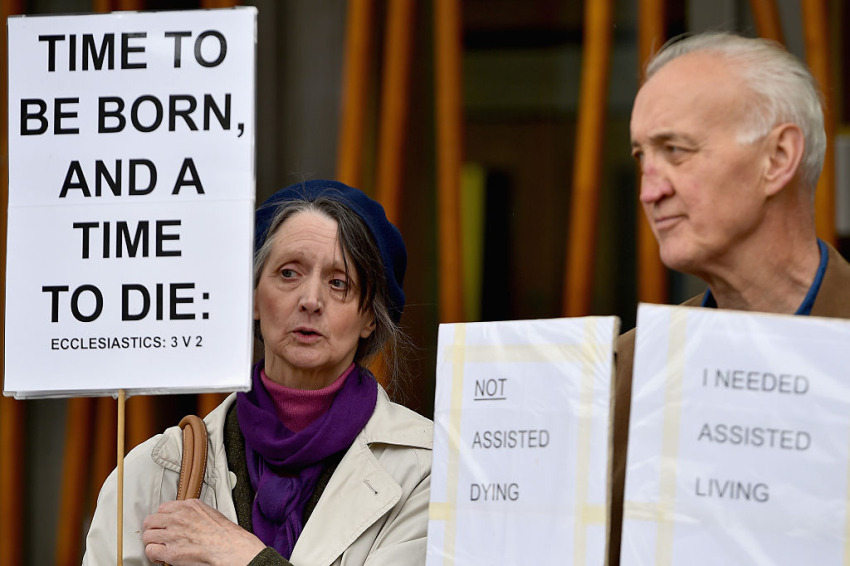Canada considering bill to remove ‘final consent’ for assisted suicide

Canada is considering a bill that would allow individuals to sign a waiver that would remove “final consent” for assisted suicide or what that country refers to as "medical aid in dying" (MAiD), in which a physician or nurse practitioner carries out the death by chemical injection.
Known as Bill S-248, the proposed legislation was given a first reading in June and is now undergoing a second reading, having been recently debated by members of Parliament.
According to the bill summary, the legislation would amend Canadian law to “permit an individual whose death is not reasonably foreseeable to enter into a written arrangement to receive medical assistance in dying on a specified day if they lose the capacity to consent to receiving medical assistance in dying prior to that day.”
It would also “permit an individual who has been diagnosed with a serious and incurable illness, disease or disability to make a written declaration to waive the requirement for final consent when receiving medical assistance in dying.”
S-248 would allow the waiving of “final consent” under certain conditions, namely if a person loses “the capacity to consent to receive medical assistance in dying,” is “suffering from symptoms outlined in the written declaration,” and has “met all other relevant safeguards outlined in the Criminal Code.”
Canadian Senator Pamela Wallin, who introduced the bill, said in a speech last month that she considered her proposed legislation to be “a common sense answer to a gap in the current law.”
“It will allow those diagnosed with dementia or Alzheimer’s the freedom from this possible Catch-22: You can’t ask in advance of a diagnosis, and once diagnosed it’s too late to ask for some time in the future,” Wallin said.
“This bill will allow a person to apply long before they actually wish to die and long before they have lost capacity to ask for [medical assistance in dying]. This offers peace of mind and a better quality of life for the time they have left with much less stress and anxiety as they live out their final days.”
Alex Schadenberg, executive director of the Euthanasia Prevention Coalition, was a critic of the bill, declaring in a blog post published Monday that “euthanasia without consent is too dangerous and beyond what should be considered tolerable.”
“Bill S-248 and the recent push by the Quebec College of Physicians to approve infant euthanasia, undermine that a person needs to be able to request or consent to euthanasia,” wrote Schadenberg.
“Tell [Parliament] that you oppose the extension of MAiD to infants, who cannot consent, and you oppose the extension of MAiD to people with dementia or other cognitive issues, who cannot consent.”
In 2016, Canada passed a law legalizing physician-assisted suicide. The law applied to citizens or permanent residents aged 18 or older who had “a serious and incurable disease, illness or disability” that included “enduring and intolerable suffering.”
The 2016 law also required medical approval, a 15-day waiting period, and mandated that two witnesses must be present when a patient signed a request for an end-of-life procedure.
Last year, Canada expanded the law to allow those with non-life-threatening disabilities to die by assisted suicide, though it still prohibited the premature death of those suffering from mental illness.
In addition to Bill S-248, Canada is also considering Bill C-7, which would expand euthanasia to those who have a mental illness and so-called “mature minors” seeking to die prematurely.
Southern Baptist Theological Seminary President Albert Mohler Jr. denounced last year’s move to expand MAiD, seeing it as proof that physician-assisted suicide was a slippery slope.
“The Canadian Parliament have now extended the logic that they had insisted would be limited to those who had a reasonable expectation of death in a short time. You've seen that that promise never is kept,” said Mohler in a 2021 episode of his podcast, “The Briefing.”
“Once you buy into the logic of physician-assisted suicide or euthanasia, you find yourself in almost every case just extending the logic further and further.”
According to the National Post, around 1,000 Canadians underwent physician-assisted suicide in 2016 when it first became legal. That number swelled to over 31,600 last year.



























